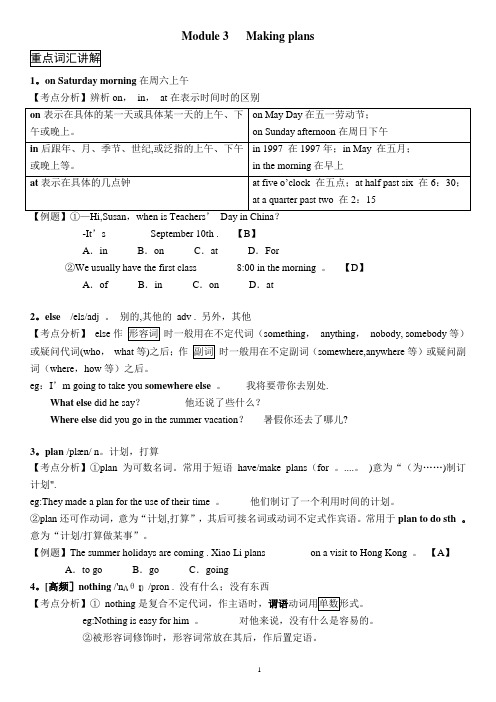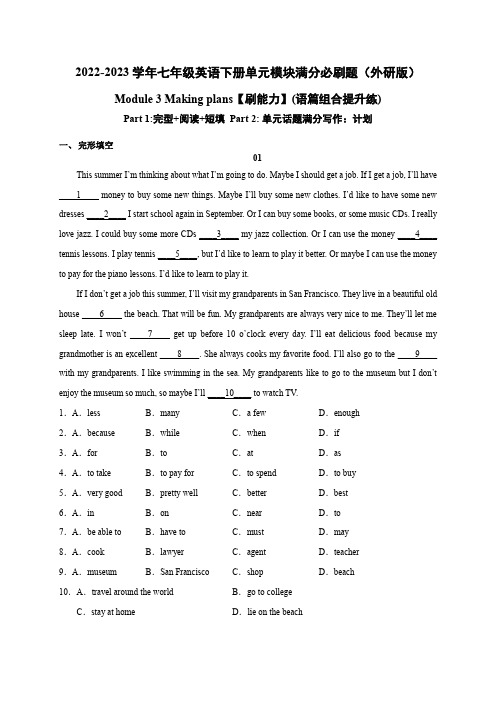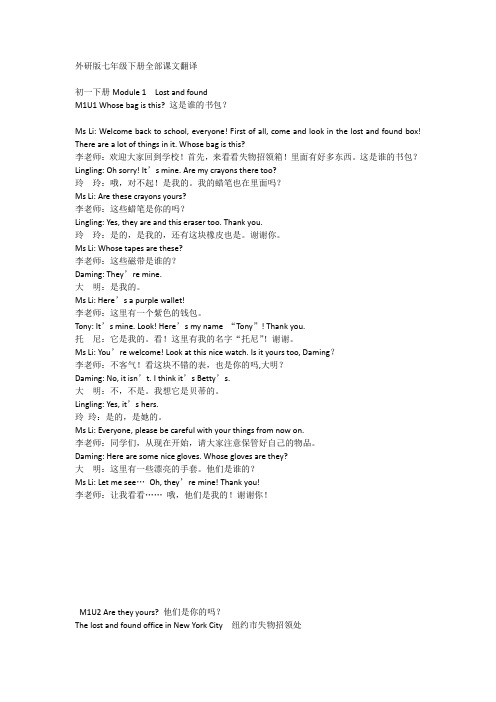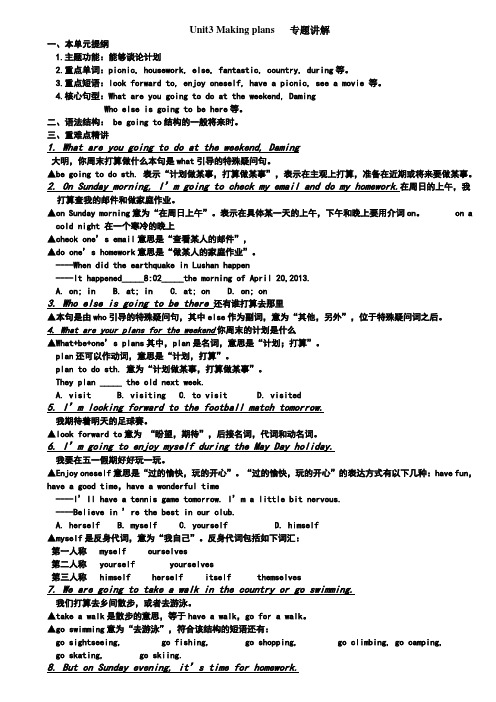七年级英语下册 Module 3 Making plans May Day文章素材 (新版)外研版
外研版七年级下册英语Module-3Making-plans知识点及练习(有答案)

Module 3 Making plans1。
on Saturday morning 在周六上午【考点分析】辨析on , in , at 在表示时间时的区别-It ’s ________ September 10th . 【B 】A .inB .onC .atD .For②We usually have the first class________8:00 in the morning 。
【D 】A .ofB .inC .onD .at2。
else /els/adj 。
别的,其他的 adv . 另外,其他【考点分析】 else 作 时一般用在不定代词(something , anything , nobody, somebody 等)或疑问代词(who , what 等)之后;作 时一般用在不定副词(somewhere,anywhere 等)或疑问副词(where ,how 等)之后。
eg :I ’m going to take you somewhere else 。
我将要带你去别处.What else did he say ? 他还说了些什么?Where else did you go in the summer vacation ? 暑假你还去了哪儿?3。
plan /plæn/ n 。
计划,打算【考点分析】①plan 为可数名词。
常用于短语 have/make plans (for 。
....。
)意为“(为……)制订计划".eg:They made a plan for the use of their time 。
他们制订了一个利用时间的计划。
②plan 还可作动词,意为“计划,打算”,其后可接名词或动词不定式作宾语。
常用于plan to do sth 。
意为“计划/打算做某事”。
【例题】The summer holidays are coming . Xiao Li plans ________ on a visit to Hong Kong 。
七下英语 WY 课文原文Module 3 Making plans

What are you going to do at the weekend, Daming?On Saturday morning, I’m going to check my email and domy homework. Then I’m going tohelp with the housework. What are yougoing to do, Betty?I’m going to see a movie in the afternoon. You can come t oo. Sure! Who else is going to be there?Nobody. Lingling is going to have a piano lesson, so shecan’t come with us, but on Sundayafternoon, Lingling and I are going tohave a picnic. Would you like to joinus?Yes, I’d love to. Are we going to meet here?No, we aren’t. We are going to meet in the park at one o’clock.Hi, everyone!Hi, Tony. What are your plans for the weekend? Nothing. I’m going to stay at home alone.Don’t be silly! You’re going to come with us. It’s going to bea fantastic weekend! AI’m looking forward to the football match tomorrow. My friends and I are going to watch our favourite team. We’re going to meet other fans, and make some new friends. We’re all going to wear the team shirt, and we’re going to cheer the players. I hope they win the match!-------MartinBI’m going to enjoy myself during the May Day holiday. On the morning of 1st May, I’m going to get up late and then read a book. In the afternoon I’m go ing out with my family and friends. We’re going to take a walk in the country or go swimming. And on 2st May we’re going to collect litter in the park near my friend’s house. It’s going to be a great holiday------busy but good fun!------Zhang SijiaCUsually I spend the Summer holiday at home, but this year is going to be very different because I’m going on a summer camp in Sydney, Australia. I’m going to stay with an Australian family and speak English. We’re also going sightseeing and going to have a picnic on the beach.-------Lucy。
外研版七年级英语下册Module3单词短语(22张)

nothing pron. 没有什么;
没有东西
nothing to do 无所事事;闲着没事 nothing but 只有;只不过 have nothing 一无所有;什么也没有 have nothing to do 无事可做 nothing at all 一无所有;什么都不是 What's wrong with you is that you think yo u can get something for nothing. 你的问题是你认为自己可以不劳而获。 Nothing could make me waver in my faith. 任何事都动摇不了我的信仰。 I listened for quite a while, but heard nothing. 我听了好一会儿, 可什么也没听见。
外研版七年级下册-M3 Making plans
forward adv. 面向未来的;
向前
look forward to 期待;盼望 looking forward 展望未来 I always look forward to getting home to my wife and children. 我总是盼望着回到家里与妻子和孩子们 团聚。 The students went forward at dawn. 学生们天一亮就出发了。 The students have put forward a se ries of questions. 学生们提出了一系列问题。
外研版七年级下册-M3 Making plans
at prep. 在……点钟
at heart 在内心;实质上; at times 有时;间或;偶尔 at ease 舒适;自由自在;不拘束; be good at==do well in 某方面擅长 He missed out at the match. 他在这次比赛中失败了。 He caught at the chance. 他急忙抓住这个机会。 'm good at my work 我对自己的工作得心应手。 I didn't like being alone at home 我不喜欢一个人呆在家里。
Module 3 Making plans【刷能力】(语篇组合提升练)-七年级英语下册单元模块满分

2022-2023学年七年级英语下册单元模块满分必刷题(外研版)Module 3 Making plans【刷能力】(语篇组合提升练)Part 1:完型+阅读+短填 Part 2: 单元话题满分写作:计划一、完形填空01This summer I’m thinking about what I’m going to do. Maybe I should get a job. If I get a job, I’ll have ____1____ money to buy some new things. Maybe I’ll buy some new clothes. I’d like to have some new dresses ____2____ I start school again in September. Or I can buy some books, or some music CDs. I really love jazz. I could buy some more CDs ____3____ my jazz collection. Or I can use the money ____4____ tennis lessons. I play tennis ____5____, but I’d like to learn to play it better. Or maybe I can use the money to pay for the piano lessons. I’d like to learn to play it.If I don’t get a job this summer, I’ll visit my grandparents in San Francisco. They live in a beautiful old house ____6____ the beach. That will be fun. My grandparents are always very nice to me. They’ll let me sleep late. I won’t ____7____ get up before 10 o’clock every day. I’ll eat delicious food because my grandmother is an excellent ____8____. She always cooks my favorite food. I’ll also go to the ____9____ with my grandparents. I like swimming in the sea. My grandparents like to go to the museum but I don’t enjoy the museum so much, so maybe I’ll ____10____ to watch TV.1.A.less B.many C.a few D.enough2.A.because B.while C.when D.if3.A.for B.to C.at D.as4.A.to take B.to pay for C.to spend D.to buy5.A.very good B.pretty well C.better D.best6.A.in B.on C.near D.to7.A.be able to B.have to C.must D.may8.A.cook B.lawyer C.agent D.teacher9.A.museum B.San Francisco C.shop D.beach10.A.travel around the world B.go to collegeC.stay at home D.lie on the beach02Ben lives in Canada. He is a 12-year-old schoolboy. His school is not far ____11____ his home. He goes to school by bike from ____12____ to Friday. He has four ____13____ in the morning and two in the afternoon. Tomorrow is Saturday, and Ben ____14____ go to school. His parents and he are planning to go to Beijing by ____15____. Ben needs to take his camera, some ____16____, food and drinks with him. They will leave Canada on December 25, and ____17____ in Beijing on December 26. They will ____18____ with Li Ming’s family for five days. Ben has only seen Tian’anmen Square on TV or in pictures. He wants to ____19____ the square and many other ____20____ places in Beijing.11.A.at B.in C.to D.from12.A.Thursday B.Wednesday C.Tuesday D.Monday13.A.classes B.subjects C.festivals D.parties14.A.can’t B.needn’t C.mustn’t D.won’t15.A.car B.ship C.plane D.subway16.A.clothes B.questions C.habits D.stores17.A.watch B.sound C.play D.arrive18.A.think B.stay C.find D.help19.A.come B.go C.visit D.know20.A.beautiful B.difficult C.healthy D.useful03I want to do many things this weekend. On Saturday morning, I’m going to ___21___ a music magazine.I love music and I ___22___ read music magazines. I often buy ___23___ in the small bookshop near my home. In the afternoon, I’m going to ___24___ to swim. My best friend, Nick, will teach me. He is ___25___ swimming. We plan to swim for two ___26___ and then go to the KFC to eat something.On Sunday, I’m going to practice(练习)playing ___27___ piano. That is what I do every Sunday morning. Playing the piano is ___28___ favorite. It’s very ___29___ and it makes me happy. In the afternoon, I’m going to do my homework and then go for a walk with my parents in the park. These are my plans _____30_____ the weekend.21.A.like B.make C.read D.start22.A.never B.often C.only D.still23.A.them B.it C.her D.other24.A.wait B.make C.arrive D.learn 25.A.good for B.bad at C.good at D.bad for 26.A.minutes B.hours C.years D.days 27.A./B.a C.the D.one 28.A.my B.mine C.me D.I 29.A.dangerous B.interesting C.clean D.silly30.A.to B.from C.for D.with二、阅读单选31.What will Anna do on October 14th?A.Take a test.B.Play tennis.C.Play baseball.D.Buy some clothes. 32.Susan’s birthday party will be _____________.A.on the morning of October 15th B.on the afternoon of October 15thC.on the morning of October 16th D.on the afternoon of October 16th 33.What will Anna buy for her mom?A.A skirt.B.A T-shirt.C.A jacket.D.A sweater. 34.Who will Anna have dinner with on October 18th?A.Lily.B.Mary.C.Her mom.D.Her dad. 35.Where will Anna go on October 20th?A.To the library.B.To the hospital.C.To Jane’s home.D.To Susan’s home.02Li Lei is a Chinese boy. He is in the UK now. He lives with Mr and Mrs Green in London. They are very nice to him.They like different foods. For breakfast, Mr and Mrs Green would like milk, eggs and some vegetables, and sometimes they have fruit. Li Lei would like milk and eggs, but he doesn’t like vegetables for breakfast.Lunch is at 12 noon. Mr and Mrs Green usually have hamburgers but sometimes they have noodles. Li Lei doesn’t like hamburgers. He thinks they’re unhealthy and he would like some rice and vegetables. After lunch, he likes to have some fruit. At around 3:30 pm or 4:00 pm Mr and Mrs Green usually have afternoon tea.36.Where does Li Lei live now?A.In New York.B.In Hong Kong.C.In London.D.In China.37.What does Li Lei have for breakfast?A.Milk and hamburgers.B.Milk and eggs.C.Two eggs and a cup of cola.D.Noodles and eggs.38.When is lunch?A.At 11:00 am.B.At two o’clock in the afternoon.C.At twelve noon.D.At 1:00 pm.39.Why doesn’t Li Lei like hamburgers?A.Because he thinks they’re not healthy.B.Because he thinks they’re expensive.C.Because he thinks they are not delicious.D.Because he thinks they’re awful.40.What are Mr and Mrs Green probably doing at 3:30 pm according to the passage?A.Maybe they are playing basketball.B.Maybe they are having a walk.C.Maybe they are swimming in the pool.D.Maybe they are having afternoon tea.03Picnic plan(计划)Time: This SundayPlace: West Hill FarmPeople: Students in Class 3, Grade 7Please take:41.The students in Class 3, Grade 7 will ________ this Sunday.A.go to school B.have a picnicC.do some shopping D.do their homework42.They will go to ________ this Sunday.A.the zoo B.the hospital C.a restaurant D.a farm43.________ will take a kite.A.Wang Ming B.Li lei C.Zhang Na D.Zhao Mei44.Zhao Mei will take ________ here.A.glasses and bottles B.juice and vegetablesC.a knife and chicken D.hamburgers and apples45.Which one is NOT right?A.Wang ming is in Class 3, Grade 7.B.They will fly a kite there.C.They don’t take any drinks there.D.They can eat hamburgers, chicken and vegetables.三、短文填空01根据汉语提示,补全下面一则学校通知。
外研版七年级下册(新)英语教案Module3Makingplans教案

外研版七年级下册(新)英语教案Module3Makingplans 教案Module 3 Making plans⼀、学习⽬标:A.单词和短语:go over, picnic, housework, on, else, nobody, at, nothing, silly, fantastic, forward, look forward to, fan, make friends, shirt, cheer, player, hope, win, enjoy oneself, during, May, May Day, late, something, walk, take a walk, country, second, collect, litter, fun, summer holiday, camp, Australian, sightseeing, go sightseeing, beach, early.B.交际⽤语:1. Sure!2. Would you like to join us?3. Don’t be silly!4.— What are you going to do on Saturday morning? — I’m going to ….5. What are you looking forward to this weekend?6. What are you going to do?7. Why are you going to do it?8. I’m going to check my email.9. Lingling and I are going to have a picnic.10. Lingling is going to have a piano lesson.11. — Are we going to meet here? — No, we aren’t.C. 教学⽬标1. Function : Talking about plans; making plans2. Structure: Be going to + verb; wh-questions and answers3. Skills: 1) Listening and understanding familiar topics (plans).2) Talking about familiar topics (plans).3) Reading and understanding simple passages.4) Composing a simple passage.4. Around the world: Weekend plans.5. Task: Talking about your weekend plans.⼆、重点及难点:be going to + verb; wh-questions and answers三、教学设计:Unit 1 What are you going to do at the weekend?ⅠTeaching modelListening and speakingⅡTeaching methodBottom-up approach to listeningⅢTeaching aims1. To understand conversations.2. Ask and answer: What are you going to do at the weekend?ⅣTeaching Objectives1. Key vocabulary: go over, picnic, housework, on, else, nobody, at, nothing, silly, fantastic2. Key structures:— What are you going to do on Saturday morning?— I’m going to ….ⅤTeaching aidsTape recorder, OHP, videoⅥTeaching StepsStep 1 Warming-up1. Show some pictures of school things. Say what they are.2. Read the words after the teacher.3. Introduce the new words.Step 2 Matching.1. Ask the students to read the word and expressions in Activity 1.AB2. Play the recording and ask the students to listen to the recording carefully.3. Match the words and expression from Box A with the word and expressions from Box B.4. Play the recording again, then they can check their answer with a partner.5. Call back the answer from the whole class and check the answer.Keys:1. check my email2. go over lessons3. have a piano lesson4. see a movie5. help with the housework6. have a picnic6. Match the expressions in Activity 1 with the pictures in Activity 2.7. Read the expressions together.Step 3 Listen and read.1. Ask the students to read the conversation silently.2. Play the recording and ask the students to listen and read the conversation.3. Read the conversation.4. Act it out.5. Learn “Everyday English”Welcome back!Please be careful with…from now on.Step 4 Answer the questions.1. Read the conversation again.2. Answer the questions.1) What’s Daming going to do on Saturday morning?2) What’s Betty going to do on Saturday afternoon?3) Who is going to have a piano lesson on Saturday?4) Where are they going to have a picnic?3. Ask the students to check with a partner.4. Play the recording again .Check the answers:Keys:1. He is going to check his email, do his homework and help with the housework on Saturday morning.2. She is going to see a movie on Saturday afternoon.3. Lingling is going to have a piano lesson on Saturday.4. They are going to meet in the park.Step 5 Complete the conversation.1. Ask the students to read the words in the box in Activity 4.2. Read through the conversation.Betty: What are your plans for next weekend, Lingling?Lingling: (1)____________. I don’t have any plans.Betty: Are you going to spend it (2)____________ at home?Lingling: Well, …what are you going to do?Betty: Tony and I are going to have a picnic in the park. We’re going to have a (3)____________ time. Are you going to come?Lingling: I’m not sure.Betty: Don’t be (4)____________! What (5)____________ are you going to do?3. Complete the conversation with the correct form of the words from the box.4. Ask the students to check with a partner.5. Check the answers:Keys: 1. Nothing 2. alone 3. fantastic 4. silly 5. else6. Read the conversation loudly.Step 6 Listen and repeat.1. Play the recording once without stopping.2. Play the recording again and stop at the end of each line. Ask the whole class to repeat.3. Play the recording again and stop at the end of each line. Ask individual students to repeat.4. Ask the students to practice the sounds in pairs.Step 7 Work in pairs.Ask and answer questions about your plants at the weekend.1. Ask and answer like this:—What are you going to do on Saturday morning?—I’m going to check my email and do my homework.2. Read through the example with the class.3. Pair them to ask and answer.4. Circulate and monitor their production.5. Complete the diary.Step 8 Guessing game.1. Show some pictures of school things.2. According to the information given and ask the students to guess what it is.3. Show the pictures to check the answers.Step 9 Language points1. On Saturday morning, I’m going to check my email and do my homework.I’m going to see a movie in the afternoon.如果我们要表达“在上午、下午、晚上”,可以说in the morning / evening / afternoon 三个词也常跟介词in连⽤。
外研版七年级下册英语课文原文与翻译

外研版七年级下册全部课文翻译初一下册Module 1 Lost and foundM1U1 Whose bag is this? 这是谁的书包?Ms Li: Welcome back to school, everyone! First of all, come and look in the lost and found box! There are a lot of things in it. Whose bag is this?李老师:欢迎大家回到学校!首先,来看看失物招领箱!里面有好多东西。
这是谁的书包?Lingling: Oh sorry! It’s mine. Are my crayons there too?玲玲:哦,对不起!是我的。
我的蜡笔也在里面吗?Ms Li: Are these crayons yours?李老师:这些蜡笔是你的吗?Lingling: Yes, they are and this eraser too. Thank you.玲玲:是的,是我的,还有这块橡皮也是。
谢谢你。
Ms Li: Whose tapes are these?李老师:这些磁带是谁的?Daming: They’re mine.大明:是我的。
Ms Li: Here’s a purple wallet!李老师:这里有一个紫色的钱包。
Tony: It’s mine. Look! Here’s my name “Tony”! Thank you.托尼:它是我的。
看!这里有我的名字“托尼”!谢谢。
Ms Li: You’re welcome! Look at this nice watch. Is it yours too, Daming?李老师:不客气!看这块不错的表,也是你的吗,大明?Daming: No, it isn’t. I think it’s Betty’s.大明:不,不是。
我想它是贝蒂的。
学生版module3makingplans专题讲解及习题

Unit3 Making plans 专题讲解一、本单元提纲1.主题功能:能够谈论计划2.重点单词:picnic, housework, else, fantastic, country, during等。
3.重点短语:look forward to, enjoy oneself, have a picnic, see a movie 等。
4.核心句型:What are you going to do at the weekend, DamingWho else is going to be here等。
二、语法结构: be going to结构的一般将来时。
三、重难点精讲1. What are you going to do at the weekend, Daming大明,你周末打算做什么本句是what引导的特殊疑问句。
▲be going to do sth. 表示“计划做某事,打算做某事”,表示在主观上打算,准备在近期或将来要做某事。
2. On Sunday mornin g, I’m going to check my email and do my homework.在周日的上午,我打算查我的邮件和做家庭作业。
▲on Sunday morning意为“在周日上午”。
表示在具体某一天的上午,下午和晚上要用介词on。
on a cold night 在一个寒冷的晚上▲check one’s email意思是“查看某人的邮件”,▲do one’s homework意思是“做某人的家庭作业”。
----When did the earthquake in Lushan happen----It happened_____8:02_____the morning of April 20,2013.A. on; inB. at; inC. at; onD. on; on3. Who else is going to be there 还有谁打算去那里▲本句是由who引导的特殊疑问句,其中else作为副词,意为“其他,另外”,位于特殊疑问词之后。
2020-2021学年七年级英语外研版下册Module3Makingplans教案

3.成果展示:每个小组将向全班展示他们的讨论成果和角色扮演活动。
(四)学生小组讨论(用时10分钟)
1.讨论主题:学生将围绕“未来职业规划”这一主题展开讨论。他们将被鼓励提出自己的观点和想法,并与其他小组成员进行交流。
2.引导与启发:在讨论过程中放性的问题来启发他们的思考。
3. Unit 3: What will you do in future?
-使用一般将来时态谈论个人未来的计划
-意愿表达和计划制定
-语法点:将来时态的构成和用法
4. Unit 4: I will be a basketball player.
-了解并描述不同职业的特点和需求
-情感态度表达:愿望、梦想和目标
-词汇学习:职业名称和相关动词短语(如:player, teacher, doctor, engineer)
本节课将结合课本内容,通过听说读写活动,帮助学生掌握一般将来时态,学会表达个人未来计划,同时拓展词汇,激发学生对未来职业的兴趣和思考。
二、核心素养目标
本章节的核心素养目标主要包括以下方面:
1.语言能力:通过学习Module 3 Making plans,学生能够熟练运用一般将来时态表达个人未来计划,掌握相关词汇和句型,提高口语交流和书面表达能力。
3.重点难点解析:在讲授过程中,我会特别强调一般将来时态的构成和用法,以及它与现在进行时态的区别。对于难点部分,我会通过举例和对比来帮助大家理解。
(三)实践活动(用时10分钟)
1.分组讨论:学生们将分成若干小组,每组讨论一个与未来计划相关的实际问题,如“你梦想中的职业是什么?”
- 1、下载文档前请自行甄别文档内容的完整性,平台不提供额外的编辑、内容补充、找答案等附加服务。
- 2、"仅部分预览"的文档,不可在线预览部分如存在完整性等问题,可反馈申请退款(可完整预览的文档不适用该条件!)。
- 3、如文档侵犯您的权益,请联系客服反馈,我们会尽快为您处理(人工客服工作时间:9:00-18:30)。
五一劳动节1889年7月14日,由各国马克思主义者召集的社会主义者代表大会,在法国巴黎隆重开幕。
这次大会上,法国代表拉文提议:把1886年5月1日美国工人争取八小时工作制的斗争日,定为国际无产阶级的共同节日。
与会代表一致同意,通过了这项具有历史意义的决议。
从此,“五一”国际劳动节诞生了。
为什么要把这一天定为国际劳动节呢?这还得从19世纪80年代的美国工人运动说起。
当时,美国和欧洲的许多国家,逐步由资本主义发展到帝国主义阶段,为了刺激经济的高速发展,榨取更多的剩余价值,以维护这个高速运转的资本主义机器,资本家不断采取增加劳动时间和劳动强度的办法来残酷地剥削工人。
在美国,工人们每天要劳动14至16个小时,有的甚至长达18个小时,但工资却很低。
马萨诸塞州一个鞋厂的监工说:“让一个身强力壮体格健全的18岁小伙子,在这里的任何一架机器旁边工作,我能够使他在22岁时头发变成灰白。
”沉重的阶级压迫激起了无产者巨大的愤怒。
他们知道,要争取生存的条件,就只有团结起来,通过罢工运动与资本家作斗争。
工人们提出的罢工口号,就是要求实行八小时工作制。
1877年,美国历史上第一次全国罢工开始了。
工人阶级走向街头游行示威,向政府提出改善劳动与生活条件,要求缩短工时,实行八小时工作制。
罢工不久,队伍日渐扩大,工会会员人数激增,各地工人也纷纷参加罢工运动。
在工人运动的强大压力下,美国国会被迫制定了八小时工作制的法律。
但是,狠毒的资本家根本不予理睬,这项法律只不过是一纸空文,工人们仍然是生活在水深火热之中,倍受资本家的折磨。
忍无可忍的工人们决定将这场争取生存权利的斗争,推向一个新的高潮,准备举行更大规模的罢工运动。
1884年10月,美国和加拿大的八个国际性和全国性工人团体,在美国芝加哥举行一个集会,决定于1886年5月1日举行总罢工,迫使资本家实施八小时工作制。
这一天终于来到了。
5月1日,美国2万多个企业的35万工人停工上街,举行了声势浩大的示威游行,各种肤色,各个工种的工人一齐进行总罢工。
仅芝加哥一个城市,就有4.5万名工人涌上街头。
这下,美国的主要工业部门处于瘫痪状态,火车变成了僵蛇,商店更是鸦雀无声,所有的仓库也都关门并贴上封条。
当时在罢工工人中流行着一首“八小时之歌”,歌中唱道:“我们要把世界变个样,我们厌倦了白白的辛劳,光得到仅能糊口的工饷,从没有时间让我们去思考。
我们要闻闻花香,我们要晒晒太阳,我们相信:上帝只允许八小时工作日。
我们从船坞、车间和工场,召集了我们的队伍,争取八小时工作,八小时休息,八小时归自己!”激昂的歌声唱出了工人的心声,唱出了全世界无产者的共同愿望,也感染了广大的群众,他们纷纷声援工人的罢工运动,将罢工运动推向新的高潮。
罢工运动所表现的巨大力量使政府当局和资本家极为恐慌,他们不甘心答应工人的条件,便露出他们狰狞的一面。
5月3日,芝加哥政府当局终于撕下了“民主”的假面具,用暴力镇压工人。
他们组织罢工破坏者在警察的保护下混进工人的罢工队伍,故意制造混乱,以此为借口,当场开枪打死六个工人。
这一暴行,激起了全市工人的极大愤慨,他们决心为死难的工人兄弟们报仇!为纪念美国工人1886年5月11日的罢工运动,为推动整个世界工人阶级的斗争热情,就把这一天定为国际无产阶级的共同节日。
在以后的每年5月1日,各国的工人阶级都举行大规模的示威游行,以争取自身的权利。
中国书法艺术说课教案今天我要说课的题目是中国书法艺术,下面我将从教材分析、教学方法、教学过程、课堂评价四个方面对这堂课进行设计。
一、教材分析:本节课讲的是中国书法艺术主要是为了提高学生对书法基础知识的掌握,让学生开始对书法的入门学习有一定了解。
书法作为中国特有的一门线条艺术,在书写中与笔、墨、纸、砚相得益彰,是中国人民勤劳智慧的结晶,是举世公认的艺术奇葩。
早在5000年以前的甲骨文就初露端倪,书法从文字产生到形成文字的书写体系,几经变革创造了多种体式的书写艺术。
1、教学目标:使学生了解书法的发展史概况和特点及书法的总体情况,通过分析代表作品,获得如何欣赏书法作品的知识,并能作简单的书法练习。
2、教学重点与难点:(一)教学重点了解中国书法的基础知识,掌握其基本特点,进行大量的书法练习。
(二)教学难点:如何感受、认识书法作品中的线条美、结构美、气韵美。
3、教具准备:粉笔,钢笔,书写纸等。
4、课时:一课时二、教学方法:要让学生在教学过程中有所收获,并达到一定的教学目标,在本节课的教学中,我将采用欣赏法、讲授法、练习法来设计本节课。
(1)欣赏法:通过幻灯片让学生欣赏大量优秀的书法作品,使学生对书法产生浓厚的兴趣。
(2)讲授法:讲解书法文字的发展简史,和形式特征,让学生对书法作进一步的了解和认识,通过对书法理论的了解,更深刻的认识书法,从而为以后的书法练习作重要铺垫!(3)练习法:为了使学生充分了解、认识书法名家名作的书法功底和技巧,请学生进行局部临摹练习。
三、教学过程:(一)组织教学让学生准备好上课用的工具,如钢笔,书与纸等;做好上课准备,以便在以下的教学过程中有一个良好的学习气氛。
(二)引入新课,通过对上节课所学知识的总结,让学生认识到学习书法的意义和重要性!(三)讲授新课1、在讲授新课之前,通过大量幻灯片让学生欣赏一些优秀的书法作品,使学生对书法产生浓厚的兴趣。
2、讲解书法文字的发展简史和形式特征,让学生对书法作品进一步的了解和认识通过对书法理论的了解,更深刻的认识书法,从而为以后的书法练习作重要铺垫!A书法文字发展简史:①古文字系统甲古文——钟鼎文——篆书早在5000年以前我们中华民族的祖先就在龟甲、兽骨上刻出了许多用于记载占卜、天文历法、医术的原始文字“甲骨文”;到了夏商周时期,由于生产力的发展,人们掌握了金属的治炼技术,便在金属器皿上铸上当时的一些天文,历法等情况,这就是“钟鼎文”(又名金文);秦统一全国以后为了方便政治、经济、文化的交流,便将各国纷杂的文字统一为“秦篆”,为了有别于以前的大篆又称小篆。
(请学生讨论这几种字体的特点?)古文字是一种以象形为主的字体。
②今文字系统隶书——草书——行书——楷书到了秦末、汉初这一时期,各地交流日见繁多而小篆书写较慢,不能满足需要,隶书便在这种情况下产生了,隶书另一层意思是平民使用,同时还出现了一种草写的章草(独草),这时笔墨纸都已出现,对书法的独立创作起到了积极的推动作用。
狂草在魏晋出现,唐朝的张旭、怀素将它推向顶峰;行书出现于晋,是一种介于楷、行之间的字体;楷书也是魏晋出现,唐朝达到顶峰,著名的书法家有欧阳询、颜真卿、柳公权。
(请学生谈一下对今文字是怎样理解的?),教师进行归纳:它们的共同特点是已经摆脱了象形走向抽象化。
B主要书体的形式特征①古文字:甲骨文,由于它处于文明的萌芽时期,故字形错落有致辞,纯古可爱,目前发现的总共有3000多字,可认识的约1800字。
金文,处在文明的发展初期,线条朴实质感饱满而丰腴,因它多附在金属器皿上,所以保存完整。
石鼓文是战国时期秦的文字,记载的是君王外出狩猎和祈祷丰年,秦篆是一种严谨刻板的纯实用性的字体,艺术价值很小。
②今文字:隶书是在秦篆严谨的压抑下出现的一种潇洒开放型的新字体,课本图例《张迁碑》结构方正,四周平稳,刚劲沉着,是汉碑方笔的典范,章草是在隶书基础上更艺术化,实用化的字体,索靖《急就章》便是这种字体的代表作,字字独立,高古凝重,楷书有两大部分构成:魏碑、唐楷魏碑是北魏时期优秀书法作品的统称。
《郑文公碑》和《始平公造像》是这一时期的代表,前者气势纵横,雄浑深厚,劲健绝逸是圆笔的典型;唐楷中的《醴泉铭》法度森严、遒劲雄强,浑穆古拙、浑厚刚健,《神策军碑》精练苍劲、风神整峻、法度谨严,以上三种书体分别代表了唐楷三个时期的不同特点。
《兰亭序》和《洛神赋》作者分别是晋代王羲之、王献之父子是中国书法史上的两座高峰,前者气骨雄骏、风神跌宕、秀逸萧散的境界,后者在技法上达到了由拙到巧、笔墨洗练、丝丝入扣的微妙的境界。
他们都是不拘泥于传统的章法和技能,对后世学书者产生了深远的影响;明代文征明的书法文雅自如,现代书家沈尹默在继承传统书法方面起到了不可魔灭的作用。
3、欣赏要点:先找几位同学说一下自己评价书法作品的标准或原则是什么?[或如何来欣赏一幅书法作品?]学生谈完后,对他们的观点进行归纳总结。
然后自己要谈一下自己的观点:书法艺术的欣赏活动,有着不同于其它艺术门类的特征,欣赏书法伤口不可能获得相对直接的印象、辨识与教益,也不可能单纯为了使学生辨识书写的内容,去探讨言词语汇上的优劣。
进而得出:书法主要是通过对抽象的点画线条、结构形态和章法布局等有“情趣意味“的形式,从客观物象各种美的体态,安致这些独有的特性中,使人们在欣赏时得到精神上健康闲静的愉悦和人们意念境界里的美妙享受(结合讲授出示古代书法名作的图片,并与一般的书法作品进行比较,让学生在比较中得出什么是格调节器高雅,什么是粗庸平常)。
书法可以说是无声的音乐,抽象的绘画,线条流动的诗歌。
四、课堂评价:根据本节课所学的内容结合板书。
让学生体会到祖国书法艺术的博大精深,着重分析学生在书体形式特点和审美欣赏方面表现出的得失。
让学生懂得在欣赏书法时主要是通过对抽像的点画线条、结构形态和章法布局等有“情趣意味“的形式,从客观物象各种美的体态,安致这些独有的特性中,使人们在欣赏时得到精神上健康闲静的愉悦和人们意念境界里的美妙享受。
